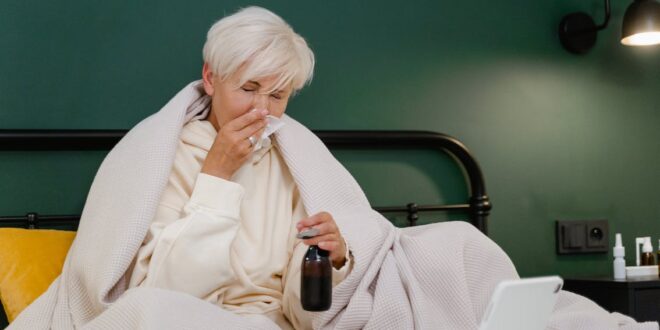Winter may be over, but colds and ’flu can feel even worse when weather is warmer. When you live alone, it’s doubly important you take good care of yourself when these bugs come calling. Use these strategies for keeping comfortable when you have only yourself to depend on.
Be prepared
When cold or ’flu strikes, it’s not the time to be heading to the pharmacy for essential supplies, so keep a rescue remedy kit in your cupboard. Include in it items such as Panadol, ’flu and cold medications, throat lozenges, tissues, nose drops, and hand sanitiser. Include some wet wipes so you can freshen up when you need to without getting out of bed. When you feel the ‘bot’ coming on, you have only one container to reach for, rather than having to gather everything together while you’re at your lowest.
Thermometer
It’s vitally important you have a thermometer in your house. That’s because there is a huge difference between phoning your medical professional to report you feel you have a temperature, and being able to supply that medical professional with an actual temperature reading. Traditional thermometers are notoriously difficult to read (especially when you’re not feeling well) so buy yourself a digital thermometer on which the reading is easy to decipher. They start at around $10, and are a great investment.
Pantry provisions
You don’t know when ‘bugs’ will strike, and not only do you not want to be shopping for easy meals and drinks when they do, you don’t want to be spreading about whatever it is you are incubating, by heading to the supermarket. Instead, keep some nourishing, fluid-rich provisions in the back of your pantry. These can include canned soups, milky breakfast energy drinks, long-life milk, and fruit juices. Choose small, single-serve packets of liquids so the contents don’t ‘lie around’ at a time when you may not be up to returning the container to the fridge. Include some heat-and eat canned meals for when you feel like eating again.
Flask at the ready
When you live alone, there’s no ‘other’ to provide a soothing cup of tea when you need it most. When the thought of getting out of bed to make it yourself is just too much, you risk denying yourself the fluids you may most be in need of. Keep a flask in the house, and when you feel able to make yourself a hot drink, fill the flask with boiling water at the same time, and take it back to your bedside table, with tea bags and an unopened packet of long-life milk at the ready, so you can reach for a cuppa when you need it.
Take charge!
When you’re alone, and not well, your devices are your link to the outside world, so keep them charged. A plugboard beside your bed is advisable, but so is an ‘extra long’ mobile phone charging cord so you can use your phone while it’s plugged in. These come in 3 to 10 metre lengths, and are invaluable. Pop one on your shopping list now, so it’s there when you need it most.
Alarm bells
Brain fog isn’t uncommon when you’re feeling unwell, but staying on top of timing with medication is essential when you live alone. Don’t simply hope you’ll remember when you last took cold or ’flu medication (or your regular meds). Keep a note book beside your bed, and note down what medication you have taken and when. Set your alarm to wake you when medication is due. Familiarise yourself with your mobile phone alarm while you are well. These handy apps allow you to set several alarms, in advance, and to title them – for example: ‘10am Saturday – Panadol.’
Phone in
Keep a handy phone list for when you feel unwell. Include in the list a family member, friend, or neighbour you can check in with regularly, and who will call you if they don’t hear from you. Add to your list the number for your GP, Healthline (should your GP not be available), pharmacy, a taxi or Uber service (should you need to get to the doctor), and a courier service (in case you have no-one who can collect a prescription for you).
Key to safety
Leave a key to your home in a safe outside location (a code-accessed lockbox is recommended) so should you need to call for help, you won’t have to leave your bed, or wait at the door for it to arrive. An accessible key is also useful if you cannot be roused by a friend or neighbour if they call to check on you, or deliver food.
No one anticipates being ill, but if you live alone, no one will be more grateful for having prepared for it, but you!









Join the Discussion
Type out your comment here:
You must be logged in to post a comment.